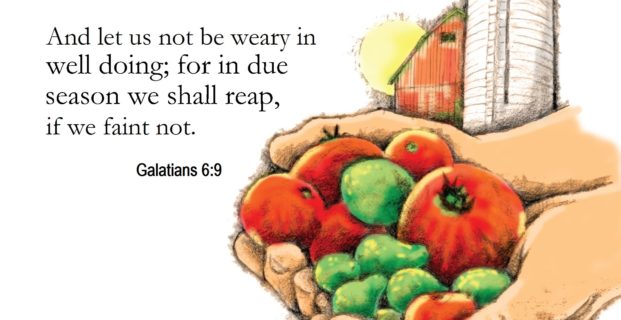Consider for a moment the words of Galatians 6:9-10,
“And let us not be weary in well doing: for in due season we shall reap, if we faint not. As we have therefore opportunity, let us do good unto all men, especially unto them who are of the household of faith.”
How often have you either read or heard this passage being preached and thought the following, “All my Christian life I have looked for opportunities to do good unto all; I helped where I could; yet, I have not seen a [benefit] from all my labors. And many times when I did help, I was taken advantage of for my good nature. Therefore, why should I continue seeking opportunities to do good?”
First, it must be stated that when we seek a “benefit” (that is, an acknowledgment, a pat-on-the-back, or a reward) for our “well doing”, we will never be satisfied by the “return”. This is because we most often over-value our own efforts. And it must also be stated that if the only reason we “do good unto others” is for a “benefit”, we have missed the “spirit” of doing good – which is to follow the examples of our Lord Jesus Christ. Consider for a moment the following passage in Matthew 6:1-4,
“Take heed that ye do not your alms before men, to be seen of them: otherwise ye have no reward of your Father which is in heaven. Therefore when thou doest thine alms, do not sound a trumpet before thee, as the hypocrites do in the synagogues and in the streets, that they may have glory of men. Verily I say unto you, they have their reward. But when thou doest alms, let not thy left hand know what thy right hand doeth: That thine alms may be in secret: and thy Father which seeth in secret himself shall reward thee openly.”
Having made the former statements, let’s consider for a moment that many also struggle with the following statement, “I would like to be obedient and do good unto others. However, I just don’t know where to begin.” In Romans 12:9-18 we find answers and directions to this dilemma,
“Let love be without dissimulation. Abhor that which is evil; cleave to that which is good. Be kindly affectioned one to another with brotherly love; in honour preferring one another; Not slothful in business; fervent in spirit; serving the Lord; Rejoicing in hope; patient in tribulation; continuing instant in prayer; Distributing to the necessity of saints; given to hospitality. Bless them which persecute you: bless, and curse not. Rejoice with them that do rejoice, and weep with them that weep. Be of the same mind one toward another. Mind not high things, but condescend to men of low estate. Be not wise in your own conceits. Recompense to no man evil for evil. Provide things honest in the sight of all men. If it be possible, as much as lieth in you, live peaceably with all men.”
It must be acknowledged that the passage in Romans 12 represents a lifetime of service unto the Lord – in “doing good unto all, especially unto those of the household of faith.” But again we must not lose sight of Galatians 6:9, for it stated, “faint not in well doing, for in due season we shall reap.” If our heart and our spirit are inclined to the “doing” instead of immediately “reaping“, the Lord has promised that there will be rewards. Though we may not realize all of the rewards/benefits for our labors in this lifetime, we are admonished by our Lord in Matthew 6:20 to, “But lay up for yourselves treasures in heaven, where neither moth nor rust doth corrupt, and where thieves do not break through nor steal:” – treasures / rewards that have an eternal value, treasures / rewards that the Lord gives you for your labors of “doing good to others”. Again, let us be exhorted, “Faint not in well doing, seek opportunities to do good unto all; for in due season we shall reap.” May our heart and our spirit be set on the eternal treasures/rewards of “doing good.” For then we will reap the eternal “benefits” of our “doing good”, as stated in Matthew 25:21,
“His lord said unto him, Well done, thou good and faithful servant: thou hast been faithful over a few things, I will make thee ruler over many things: enter thou into the joy of thy lord.”



